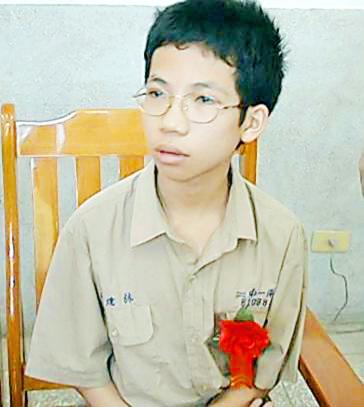Thin, quiet and shy, inconspicuous 13-year-old Lin Chien-yi (
Lin's name, together with the names of 77,450 others who passed the Joint College Entrance Examination, yesterday appeared on a bulletin board outside National Taiwan University, as is the custom.

TAIPEI TIMES FILE PHOTO
"We are all very pleased with the result," Lin Chuan-fu (
The child prodigy was not available to speak to a reporter yesterday, his father said, because "he has gone out with his friends."
Two weeks ago, after receiving his score on the college entrance exam, the country's youngest high school graduate told media he was very happy to have gained a place in his department of choice -- the electrical engineering department of the nation's top-ranked university.
Lin's grade was 451.7 -- out of a maximum score of 500 -- putting him 98th among the tens of thousands of examinees. He scored 100 percent in mathematics, 98.5 in chemistry and 90.6 in physics.
The elder Lin, a physics and chemistry teacher at Luchu High School in Kaohsiung County, said his son took just eight years to complete his pre-university education.
When he was in the first grade, the boy was able to pick up mathematical concepts that most students don't learn until much later, the elder Lin said.
While acknowledging the extraordinary talents of his student, Lin Chou-pin (
"Of course the boy is bright, but what was more vital was his keen motivation to learn and to progress," the uncle said. "Study overrides everything else. It's amazing to see a child with such discipline in the quest for knowledge."
His concentration has been evident ever since he was small, Lin's aunt said. He would stare at moving ants or a vase for long periods of time, she said. "He was very observant and very focused."
Although three to four years younger than his immediate classmates in school, Lin has never had problems making friends. His classmates valued him for the assistance he gave them with their studies. In return, they took Lin under their wing, looking after him as he made his way through school.
Lin once told reporters that he acquired his goal of becoming a university student at a young age when he saw a TV news report regarding a 12-year-old American entering college.
He pledged to follow suit, hoping to become Taiwan's youngest university student.
But Lin has paid a price to achieve his success, saying he has been deprived of many of the usual pursuits enjoyed by his classmates.
He's a member of the chess club at school, but gets little time to enjoy the video games he loves to play because he is so preoccupied with school work.
The gifted young man also excels at games for adults. "He's a master of Mahjong," his aunt said.

FREEDOM OF NAVIGATION: The UK would continue to reinforce ties with Taiwan ‘in a wide range of areas’ as a part of a ‘strong unofficial relationship,’ a paper said The UK plans to conduct more freedom of navigation operations in the Taiwan Strait and the South China Sea, British Secretary of State for Foreign, Commonwealth and Development Affairs David Lammy told the British House of Commons on Tuesday. British Member of Parliament Desmond Swayne said that the Royal Navy’s HMS Spey had passed through the Taiwan Strait “in pursuit of vital international freedom of navigation in the South China Sea.” Swayne asked Lammy whether he agreed that it was “proper and lawful” to do so, and if the UK would continue to carry out similar operations. Lammy replied “yes” to both questions. The

‘OF COURSE A COUNTRY’: The president outlined that Taiwan has all the necessary features of a nation, including citizens, land, government and sovereignty President William Lai (賴清德) discussed the meaning of “nation” during a speech in New Taipei City last night, emphasizing that Taiwan is a country as he condemned China’s misinterpretation of UN Resolution 2758. The speech was the first in a series of 10 that Lai is scheduled to give across Taiwan. It is the responsibility of Taiwanese citizens to stand united to defend their national sovereignty, democracy, liberty, way of life and the future of the next generation, Lai said. This is the most important legacy the people of this era could pass on to future generations, he said. Lai went on to discuss

MISSION: The Indo-Pacific region is ‘the priority theater,’ where the task of deterrence extends across the entire region, including Taiwan, the US Pacific Fleet commander said The US Navy’s “mission of deterrence” in the Indo-Pacific theater applies to Taiwan, Pacific Fleet Commander Admiral Stephen Koehler told the South China Sea Conference on Tuesday. The conference, organized by the Center for Strategic and International Studies (CSIS), is an international platform for senior officials and experts from countries with security interests in the region. “The Pacific Fleet’s mission is to deter aggression across the Western Pacific, together with our allies and partners, and to prevail in combat if necessary, Koehler said in the event’s keynote speech. “That mission of deterrence applies regionwide — including the South China Sea and Taiwan,” he

UNPRECEDENTED: In addition to the approved recall motions, cases such as Ma Wen-chun’s in Nantou are still under review, while others lack enough signatures The Central Election Commission (CEC) announced yesterday that a recall vote would take place on July 26, after it approved the first batch of recall motions targeting 24 Chinese Nationalist Party (KMT) lawmakers and Hsinchu Mayor Ann Kao (高虹安). Taiwan is in the midst of an unprecedented wave of mass recall campaigns, following a civil society push that echoed a call made by Democratic Progressive Party (DPP) caucus whip Ker Chien-ming (柯建銘) in January to initiate signature drives aimed at unseating KMT legislators. Under the Civil Servants Election and Recall Act (公職人員選舉罷免法), Taiwanese can initiate a recall of district-elected lawmakers by collecting